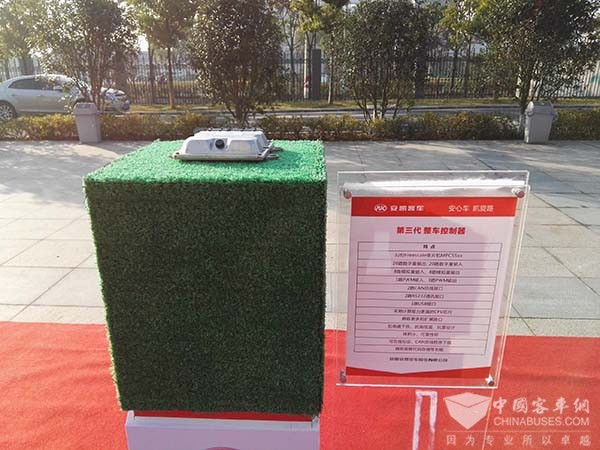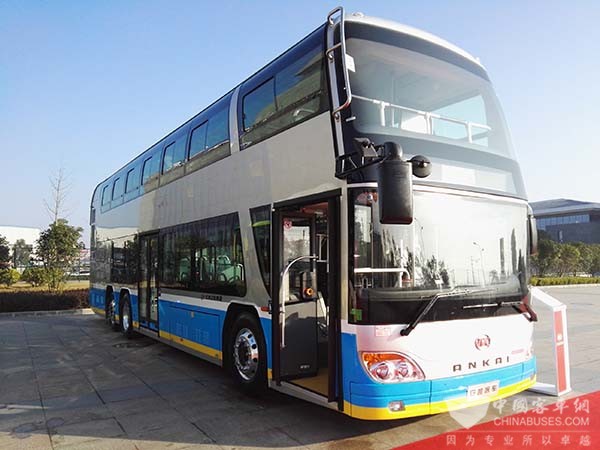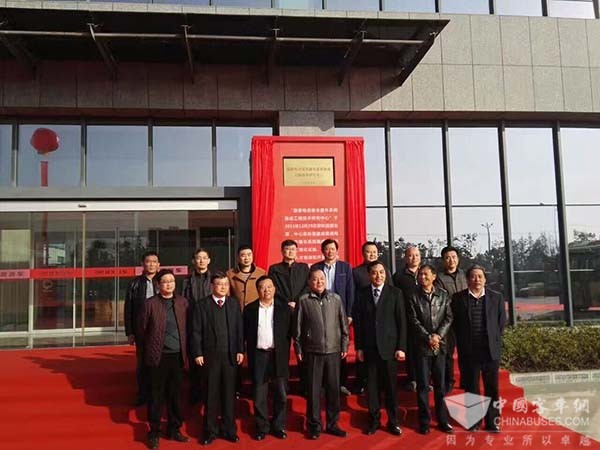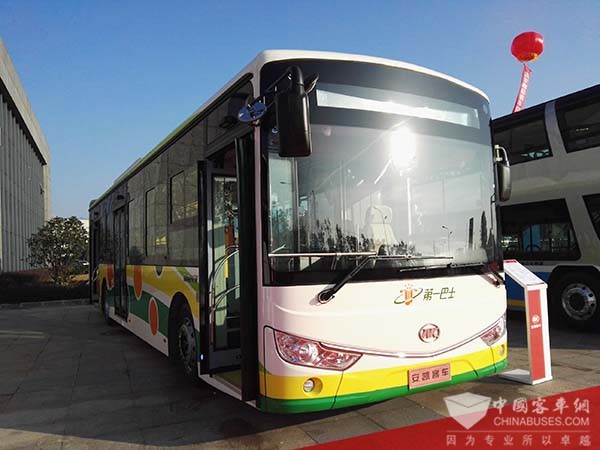China National Electric Bus Whole-Vehicle Integration Engineering Research Center Revealed at Ankai
2016-12-06
On December 5, China National Electric Bus Whole-Vehicle Integration Engineering Research Center was officially revealed at Ankai
On December 5, China National Electric Bus Whole-Vehicle Integration Engineering Research Center was officially revealed at Ankai. As the top research institution for new energy buses, the center is the first and only one in China that is specialized in researching and developing electric buses. By fully integrating the R&D, engineering experiment, production, talent cultivation, and open services, the center is fully prepared to further enhance the overall competitiveness of China’s bus manufacturing industry in the global market.
China National Electric Bus Whole-Vehicle Integration Engineering Research Center was officially revealed at Ankai
Wang Xuelei, Director of Anhui Provincial Technologies & Science Bureau Hi-Tech Section, and Dai Maofang, president of Ankai, jointly revealed the plate of the center to the public. Cha Baoying, General Manager of Ankai delivered a keynote speech. According to Mr. Cha, the center was approved by China’s Ministry of Science and Technology on December 29, 2011. On February 26 this year, the center passed the assessment of a panel of experts. Also at the ceremony, a number of experts in China’s new energy bus industry, officials from governments, professors and researchers from universities, bus operators, and journalists from various media witnessed the historical moment.

Now, boasting the state-of-art research & development infrastructure and facilities, the center is fully committed to integrating the innovative resources from both home and abroad, developing key spare parts for electric buses, and pushing forward the development of China’s electric bus industry. The center consists of an R&D and Experiment & Testing Center covering an area of 28,000 square meters and a new energy bus production base with a total area of 94,000 square meters. It has five laboratories, including Power System Lab, Power Battery Lab, Electric Control Lab, Whole Vehicle R&D and Performance Lab, Spare Parts Performance Lab. It is fully capable of researching and developing whole new energy vehicles, power systems, power battery systems, whole vehicle control systems and key spare parts. So far, the center has passed China’s CNAS Whole Vehicle Performance Lab Certification.

It is revealed that the center has already obtained 311 national patents, including 102 invention patents and 209 authorized patents. All these patents cover a number of frontier areas in electric bus manufacturing industry, such as whole vehicle control systems, electric motor control systems, long-distance monitoring systems, power management, and heat ventilation systems. In addition, the center has participated in the creation of 15 national and industrial standards. By joining hands with other enterprises and some renowned universities, the center has also been involved in 17 national and provincial level research projects. So far, it has established long-term cooperative ties with Shanghai Jiaotong University, University of Science and Technology of China, University of California, Davis, etc.
Adhering to “Safety and Innovation”, Ankai has been constantly strengthening its efforts in developing motors, electric controlling systems, and electric cores as well as improving the active and passive safety standards. Ankai e-Control Intelligent Management System has already made the driving and traveling much safer and more comfortable and reliant for both drivers and passengers.
Ankai electric Best buses, A series new energy buses, and G9 city buses have all been warmly embraced by both bus operators and the general public. So far, Ankai new energy buses have made their way to over 50 cities across China. In 2010, 30 units Ankai electric buses were put into official operation on the world’s first electric bus route. So far, they has been working smoothly.
As early as 2003, Ankai started researching and developing new energy vehicles. Currently, it boasts a wide spectrum of new energy products, including 6-12 meters electric city buses, travel coaches, and commuting vehicles, as well as 8-12 meters plug-in hybrid city buses, double-deckers, sight-seeing coaches. Moreover, a number of key spare parts and technologies used for new energy vehicles, have been independently developed by Ankai, including whole-vehicle controllers, AC asynchronous motors and permanent synchronous motors, CAN systems, wheel hub motor bridge, electric controllers, and BMS.
In 2008, Ankai set up Anhui New Energy Commercial Vehicle Engineering Research Center. In the same year, it played a leading role in helping creating Anhui New Energy Vehicle Technological Innovation Strategic Alliance, which is aimed at promoting communications and cooperations between different enterprises and universities. After over a decade’s development, Ankai has formed formidable strengths in whole vehicle configuration, power integration, electric control technologies, and long-distance control. Its whole vehicle control systems, driving motors, electric controllers, BM management systems have all been successfully applied on Ankai buses and have greatly enhanced the overall competitiveness of the brand in the global bus market.



